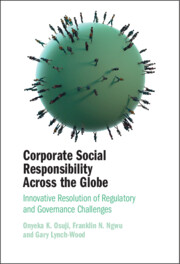 Corporate Social Responsibility Across the Globe
Corporate Social Responsibility Across the Globe from Part II - Infusing Corporate Social Responsibility in Corporate Governance
Published online by Cambridge University Press: 15 June 2023
This chapter underlines the need for contextualism in showing that small and medium enterprises (SMEs) are more suited than multinational enterprises for wider corporate social responsibility (CSR) activities and impacts in developing and emerging markets. While highlighting institutional conditions for enabling socially responsible practices by firms, it is argued that an appropriate regulatory environment is necessary to enhance the potential of SMEs.
To save this book to your Kindle, first ensure no-reply@cambridge.org is added to your Approved Personal Document E-mail List under your Personal Document Settings on the Manage Your Content and Devices page of your Amazon account. Then enter the ‘name’ part of your Kindle email address below. Find out more about saving to your Kindle.
Note you can select to save to either the @free.kindle.com or @kindle.com variations. ‘@free.kindle.com’ emails are free but can only be saved to your device when it is connected to wi-fi. ‘@kindle.com’ emails can be delivered even when you are not connected to wi-fi, but note that service fees apply.
Find out more about the Kindle Personal Document Service.
To save content items to your account, please confirm that you agree to abide by our usage policies. If this is the first time you use this feature, you will be asked to authorise Cambridge Core to connect with your account. Find out more about saving content to Dropbox.
To save content items to your account, please confirm that you agree to abide by our usage policies. If this is the first time you use this feature, you will be asked to authorise Cambridge Core to connect with your account. Find out more about saving content to Google Drive.